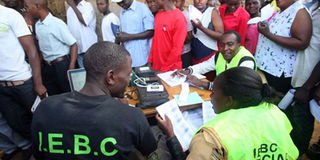Scepticism, not apathy, was reason for low turnout

People line up to register to vote in this photograph taken in Kabiro in Kawangware, Nairobi on January 18, 2017. PHOTO | EVANS HABIL | NATION MEDIA GROUP
What you need to know:
The distinction between apathy and scepticism may appear as a pedantic one, but it is important.
Since, if the problem is largely one of scepticism, rather than apathy, then voter education interventions need to be more nuanced and to consider how to change individual behaviour given widely held perceptions of how others can be expected to behave.
There has been much talk recently of the problem of political apathy in Kenya. This idea gained credence during the recently concluded mass voter registration process when Kenyans were initially slow to turn out, and the Independent and Electoral Boundaries Commission fell far short of its target of 6 million new voters.
However, this target was always ambitious. Indeed, from a comparative perspective, it is impressive that the Commission was able to register almost 4 million voters since the 2013 election; with around 80 per cent of Kenyans who have identity cards now registered. Just as importantly, the majority of Kenyans (albeit not all) still seem to care and talk about politics, and will likely turn out to vote in August.
Moreover, even if fewer people turn out than in 2013, this will not necessarily reflect apathy, since the turnout in that election was unusually high at 86 per cent of registered voters. This is far higher than most countries around the world. For example, turnout in Uganda’s 2016 and Tanzania’s 2015 elections was 68 and 67 per cent respectively, while turnout in the American election last year was just 58 per cent.
SIX POSITIONS
At the same time, the fact that Kenyans vote for six elected positions on a single day – for the president, Member of Parliaments, senators, governors, Woman’s Representative and Member of County Assembly – means that many will be motivated to turn out to vote for one, two or three of these elected officials, and will end up voting for all six.
Indeed, the problem seems to be one – not of apathy – but of political scepticism whereby many view politicians as all the same; namely, as opportunistic, selfish, corrupt and ethnically biased. Such perceptions help to shape political behaviour in important ways.
This includes a tendency to be more accepting of “bad behaviour” – especially by leaders who one views as the “least bad” – with malpractice coming to be viewed almost as a norm.
At the same time, it leads some to encourage or even demand certain forms of malpractice. This includes voter bribery.
This understanding of the political environment also encourages some to participate more directly in certain forms of behaviour that they may be critical of in the abstract.
ETHNIC VOTING
This includes ethnic voting. Since, an assumption of ethnically biased leadership encourages a reinforcing cycle of expectation and action – as voting for one of your own becomes a rational response to the system as perceived. In short, and as the sociologist Pierre can den Berghe has argued, the very assumption that ethnicity is “a major determinant and predictor of social behaviour” encourages people to support ethnic “big-men”, ensuring that expectations become “self-fulfilling, thereby ‘validating’ the theory”.
As a result, politicians who do not pay lip service to ethnicity lose out to uncertainty, fear, suspicion, and conservatism.
However, perverse motivations may also extend to other forms of behaviour that are usually labelled as “wrong” – such as ballot stuffing, violence and intimidation. This was evident recently when talking to a party activist who admitted to having been involved in ballot stuffing in previous elections. His justification was simple: since the other party was bound to try and increase their proportion of the vote in their own ethnic stronghold, it would be naïve not to do the same in one’s own “backyard”.
This distinction between apathy and scepticism may appear as a pedantic one, but it is important. Since, if the problem is largely one of scepticism, rather than apathy, then voter education interventions need to be more nuanced and to consider how to change individual behaviour given widely held perceptions of how others can be expected to behave.
Gabrielle Lynch is associate professor of comparative politics, University of Warwick, the United Kingdom and columnist, Saturday Nation.
@GabrielleLynch6





